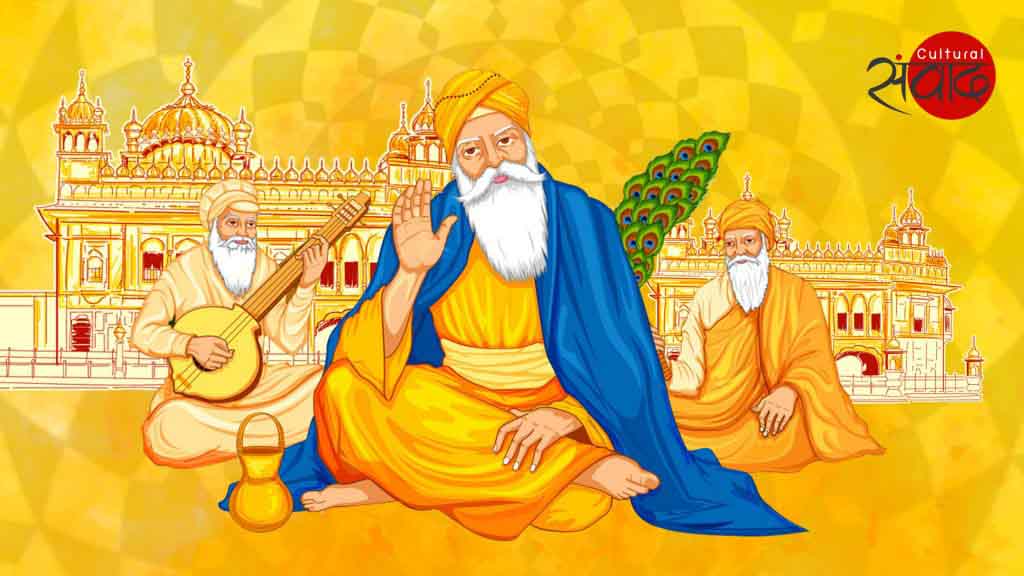He proclaimed the Divine as ‘Ik Onkaar’. He preached that there was no Hindu and no Musalmaan. He debunked the caste system and spoke of an exalted status for women, heralding a new chapter in Indian thought. He was Guru Nanak Dev – a true mystic and a true reformer, the first of the ten human gurus in the Sikh tradition and one of the greatest saints born on the spiritual land of India.
Join Cultural Samvaad’s WhatsApp community
Guru Nanak Devji was born at Talwandi Rai Bhoeki (now Nankana Sahib in Pakistan) in 1469 CE. Traditionally, the full moon day of the Indian month of Kartika (Kartika Purnima) is celebrated as Gurpurab to mark his birthday.[i]
He preached in the language of the masses. His messages on life were simple yet profound and the path he propagated was easy yet difficult. Equality formed the cornerstone of Guru Nanak Devji’s preachings.
Mool Mantar
His conception of the Divine is encapsulated in the lofty ‘Mool Mantar’ . The Guru Granth Sahib opens with this timeless composition of Guru Nanak Devji – ‘Ik Onkaar Satnaam Kartaa Purakh Nirbhau Nirvair Akaal Moorat Ajooni Saibhang Gurparsaad. Jap – Aad Sach, Jugaad Sach, Hai Bhi Sach, Nanak Hosi Bhi Sach.’
Loosely translated[ii] –
Ik Onkaar – God is One and permeates the universe (the oneness cannot be emphasised enough – the number one is used).
Satnaam – God’s name is the Eternal Truth.
Kartaa Purakh – God is the Sole Creator.
Nirbhau – God has no fear.
Nirvair – God is free from malice and has no enemies.
Akaal Moorat – God is timeless and formless.
Ajooni – God was (is) not born.
Saibhang – God is self- existent – not created (swayambhu in Sanskrit).
Gurprasad – God can be attained with the grace of the Guru.
Jap:
Aad Sach – God was true before creation
Jugaad Sach – God was true when time began (God is true in all ages or yugas)
Hai Bhi Sach – God is true now
Nanak Hosi Bhi Sach – Nanak says God will always be true
इस लेख को हिन्दी में पढ़ें |
Naam japana, Krit karna, Wand chakhna.
Guru Nanak Devji prescribed the path of: Naam japana, Krit karna, Wand chakhna. This path is also referred to as the three principles of his teachings.
Be aware of the presence of Ik Onkar at all times. Chant God’s name (Naam), meditate on God’s name –‘Eko naam hokum hai Satguru dia bujhai jio’. Loosely translated it means that it is the Lord’s commandment to contemplate upon the Naam. Be honest and hardworking as you earn your living and lead your life. Be generous, caring and gracious – share what you have with those who need it. This is the essence of seva. He exhorted the masses not to covet other’s wealth (para dhan) and not to speak ill of others (para ninda).
‘Naam, Daan, Ishnaan’
Guru Nanakji contextualised human beings’ relation to The Divine, our fellow human beings and to our own self in his beautiful aphorism – ‘Naam, Daan, Ishnaan’. Naam and Daan (giving) are self-explanatory. Ishnaan (Snaana or Bathing) signifies purity – purity of the soul and thought and cleanliness – physical, social and environmental. Ishnaan becomes particularly relevant in contemporary India where cleanliness seems to be the most dispensable virtue as we struggle for a clean nation.
Guru Nanak Devji’s teachings on life and living, like his vision of the Divine are true across barriers of time and applicable to one and all notwithstanding narrow walls erected by human beings. May they continue to illuminate and enlighten.

Image Courtesy: Government Museum and Art Gallery, Chandigarh, India
[i] Most scholars place his date of birth as April 15, 1469.
[ii] This is not a definitive translation. Please refer to beautiful commentaries written on the Mool Mantar expounding its meaning by scholars. God is Onkaar in this translation for ease of reading. The word ‘He’ has been specifically avoided since it is not in the original context.



Nice article about Guru Nanak Devji’s.
Aap sahi raste par hai. Hamaare sahitya ki decodin ki hi aavashyakta hai..
9893078872